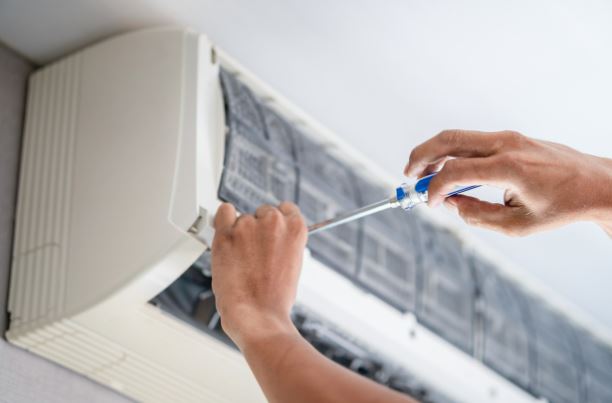Central Air Conditioning Vs. Window Units: What’s Best?

Choosing an air conditioning system that is right for your home can be a daunting task. With all the options available, it's no surprise that many homeowners feel overwhelmed. When you take time to compare central air conditioning and window units, there are advantages and disadvantages. But what about mini-split AC versus window units? Or heat pumps versus window AC? What should you know about each system if you're ready to upgrade or replace your current system? Let's break it all down.
Overview of Various Cooling Systems
The best AC system for your home offers energy savings, great indoor comfort, and boosted energy efficiency. Below, we outline four common types.
Central Air Conditioning
Central air conditioning is a whole-home cooling system that utilizes ductwork to disperse cool air throughout your house. It (typically) involves two components: an indoor unit (the air handler) and an outdoor unit (the condenser and compressor). It works by pulling warm air from your home, cooling it, and then distributing it evenly through ducts to every room.
- Ideal for homes with existing ductwork and multi-story homes
Window AC Units
These compact cooling units are installed into window frames to cool single rooms.
- Ideal for renters, small apartments, and temporary cooling needs
Ductless Mini-Split AC
Ductless AC does not rely on ductwork to cool your home. Instead, ductless mini-splits are mounted on the walls or ceilings of only the rooms you wish to cool.
- Ideal for homes without ductwork, room additions, remodels, and those who prefer zoned cooling
Heat Pumps
Unlike traditional systems that generate heat, heat pumps transfer heat between indoor and outdoor air depending on the season — offering both heating and cooling in one system.
- Ideal for homes in milder climates, those replacing both an AC and a furnace, and new construction
Pros and Cons: Central AC vs. Window Units
If you've never had central air, you might be wondering the pros and cons of central air versus window AC. Let's look at each system.
Central Air Conditioning
Pros of Central AC include:
- Provides consistent whole-home cooling
- Integrates with existing ductwork
- Compatible with programmable/smart thermostats
Cons of Central AC include:
- Requires ductwork to be installed
- Initial high cost
- Requires year-round maintenance
Window Units
Pros of Window AC Units include:
- Affordable cost upfront
- Quick-fix solution
- Ideal for spot cooling
- Portable/removable
Cons of Window AC include:
- Limited to single rooms
- Can be noisy
- Blocks window views and incoming light
- Lacks good air filtration
Still wondering if it's better to have window units or central air conditioning? If you live in Virginia, central air conditioning is often the better long-term choice. Its ability to cool every room evenly, reduce noise, and improve indoor air quality makes it ideal for multi-story homes or high-humidity climates. Plus, with regular maintenance checks by Total Comfort, your central AC will keep your home cool all season and provide peace of mind. Window units, on the other hand, can be aesthetically displeasing, zap up extra energy, and may also block out natural light to a room.
Mini-Split AC vs. Heat Pump: Key Differences
Now let's dig into the mini-split AC versus the heat pump. Both systems offer high energy efficiency, but they suit different home types and needs. Here's what to know if you're choosing between them:
If your home does not have ductwork, a mini-split AC may be a good choice. They offer zoned cooling, high energy efficiency, quiet operation, and are perfect for converted spaces (think attic apartments, computer rooms, or garage workshops). While they initially have a high upfront cost, the long-term benefits and energy savings make up for it.
Heat pumps are an excellent choice if you are replacing both AC and a furnace and wish to switch to an all-in-one heating and cooling system. Added benefits of a heat pump include lower operating costs, high energy efficiency, and the possibility of tax credits (although these expire at the end of 2025). While their price might be high upfront, the savings garnered down the road balance out.
